Products
-
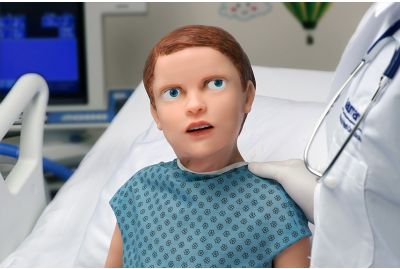 Pediatric HAL® S2225 - Wireless and Tetherless Pediatric Patient SimulatorS2225.PKLearn MorePediatric HAL® is the world's most advanced pediatric patient simulator and the first capable of simulating lifelike emotions through dynamic facial expressions, movement, and speech. HAL is designed to help providers of all levels develop the specialized skills needed to effectively communicate, diagnose, and treat young patients in nearly all clinical areas.
Pediatric HAL® S2225 - Wireless and Tetherless Pediatric Patient SimulatorS2225.PKLearn MorePediatric HAL® is the world's most advanced pediatric patient simulator and the first capable of simulating lifelike emotions through dynamic facial expressions, movement, and speech. HAL is designed to help providers of all levels develop the specialized skills needed to effectively communicate, diagnose, and treat young patients in nearly all clinical areas. -
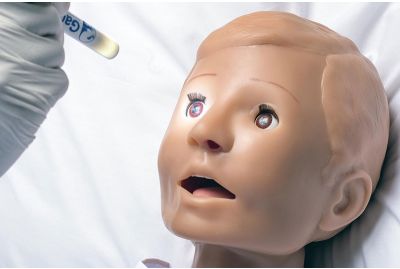 Pediatric HAL® S3005 - Wireless and Tetherless, Five-Year-Old Patient SimulatorS3005.PKLearn MoreFrom nursing to emergency care, the Pediatric HAL® S3005 Five-Year-Old Patient Simulator allows you to train teamwork and patient care skills through hands-on exercises. Pediatric HAL® is wireless and tetherless and remains fully functional while being moved from place to place.
Pediatric HAL® S3005 - Wireless and Tetherless, Five-Year-Old Patient SimulatorS3005.PKLearn MoreFrom nursing to emergency care, the Pediatric HAL® S3005 Five-Year-Old Patient Simulator allows you to train teamwork and patient care skills through hands-on exercises. Pediatric HAL® is wireless and tetherless and remains fully functional while being moved from place to place. -
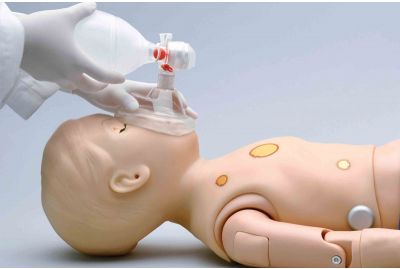 Pediatric HAL® S3004 - Wireless and Tetherless, One-Year-Old Patient SimulatorS3004.PKLearn More
Pediatric HAL® S3004 - Wireless and Tetherless, One-Year-Old Patient SimulatorS3004.PKLearn MorePediatric HAL® is a high-fidelity toddler patient simulator specifically designed to meet the needs of pediatric care training programs. Pediatric HAL can help your care teams improve teamwork and patient care through hands-on scenario-based training. Participants can practice and develop airway management, auscultation, ventilation, CPR, IV/IO placement skills, and more.
-
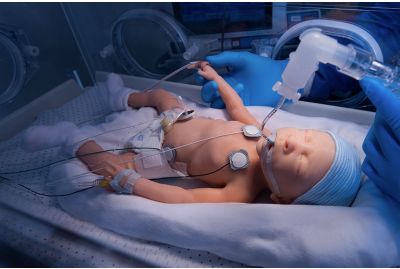 Premie HAL® S2209 30-Week Premature Infant Patient SimulatorS2209.PKLearn MoreLifelike, Wireless and Tetherless Preterm Patient Simulator.The Premie HAL® S2209 is a lifelike, wireless and tetherless 30-week preterm patient simulator designed to facilitate the training of residents and health care professionals in the areas of preterm airway management, resuscitation, stabilization, transport, and intensive care.
Premie HAL® S2209 30-Week Premature Infant Patient SimulatorS2209.PKLearn MoreLifelike, Wireless and Tetherless Preterm Patient Simulator.The Premie HAL® S2209 is a lifelike, wireless and tetherless 30-week preterm patient simulator designed to facilitate the training of residents and health care professionals in the areas of preterm airway management, resuscitation, stabilization, transport, and intensive care. -
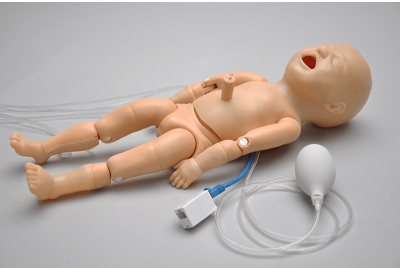 Premie™ Blue S108 - Premature Newborn Simulator with SmartSkin™ and OMNIS108.PKLearn More
Premie™ Blue S108 - Premature Newborn Simulator with SmartSkin™ and OMNIS108.PKLearn MoreThe Premie™ Blue depicts a 28-week premature infant and includes an injection arm and intraosseous leg. Students can intubate the simulator as well as perform BVM and CPR. Premie™ Blue changes color based upon an initial pre-selected condition and measures the effectiveness of airway ventilation and chest compression.
-
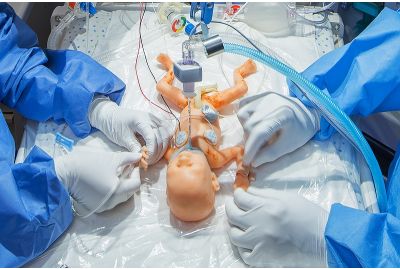 Premie HAL® S108.100 - 24-Week Preterm Newborn Skills TrainerS108.100.PKLearn MoreThe Premie HAL® S108.100 is a lifelike, 24-week preterm patient simulator designed to facilitate the training of healthcare professionals in the areas of airway management, respiratory support, and resuscitation.
Premie HAL® S108.100 - 24-Week Preterm Newborn Skills TrainerS108.100.PKLearn MoreThe Premie HAL® S108.100 is a lifelike, 24-week preterm patient simulator designed to facilitate the training of healthcare professionals in the areas of airway management, respiratory support, and resuscitation. -
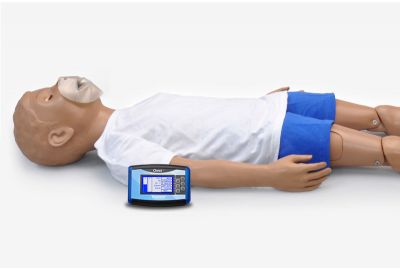 Five-Year-Old CPR Patient Simulator with OMNI® (S154)S154.PKLearn MoreThe Five-Year-Old CPR Patient Simulator with OMNI® is a full-body patient simulator designed to help participants practice and hone pediatric nursing skills. The S154 is a useful training tool for CPR, ventilation, IV access and infusion, trauma care, and general patient care exercises.
Five-Year-Old CPR Patient Simulator with OMNI® (S154)S154.PKLearn MoreThe Five-Year-Old CPR Patient Simulator with OMNI® is a full-body patient simulator designed to help participants practice and hone pediatric nursing skills. The S154 is a useful training tool for CPR, ventilation, IV access and infusion, trauma care, and general patient care exercises. -
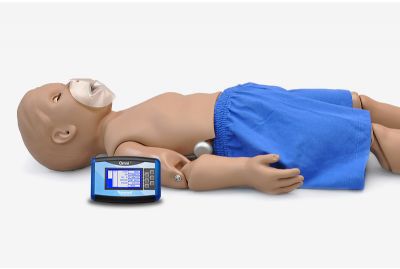 One-Year-Old CPR Patient Simulator with OMNI® (S114)S114.PKLearn MoreThe One-Year-Old CPR Patient Simulator with OMNI® is a full-body 1-year pediatric patient simulator designed to help participants practice and hone basic life support and CPR skills. Participants can work hands-on during chest compression and ventilation exercises while educators can monitor CPR performance and receive quality metrics in real-time with OMNI®.
One-Year-Old CPR Patient Simulator with OMNI® (S114)S114.PKLearn MoreThe One-Year-Old CPR Patient Simulator with OMNI® is a full-body 1-year pediatric patient simulator designed to help participants practice and hone basic life support and CPR skills. Participants can work hands-on during chest compression and ventilation exercises while educators can monitor CPR performance and receive quality metrics in real-time with OMNI®. -
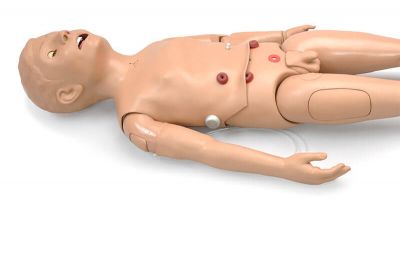 Five-Year-Old Multipurpose Patient Simulator (S157)S157.PKLearn MoreThe Five-Year-Old Multipurpose Patient Simulator is designed to help participants practice and develop pediatric nursing care and resuscitation skills, including CPR, intubation, trach care, IV access, and more.
Five-Year-Old Multipurpose Patient Simulator (S157)S157.PKLearn MoreThe Five-Year-Old Multipurpose Patient Simulator is designed to help participants practice and develop pediatric nursing care and resuscitation skills, including CPR, intubation, trach care, IV access, and more. -
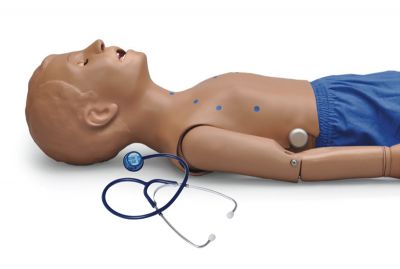 5-Year-Old Patient, Heart and Lung Sounds Skills Trainer (S314.200)S314.200.PKLearn MoreThe 5-Year-Old Patient Heart and Lung Sounds Skills Trainer is a new site-specific upgrade for your existing Gaumard® pediatric manikin. Teach site-specific heart and lung auscultation skills using seamless simulation technology. Simply press the bell against the skin and listen. Students use anatomic landmarks on the manikin to locate the site where a specific sound should be heard. If correct, they will hear the appropriate sound through the stethoscope and/or external speakers.
5-Year-Old Patient, Heart and Lung Sounds Skills Trainer (S314.200)S314.200.PKLearn MoreThe 5-Year-Old Patient Heart and Lung Sounds Skills Trainer is a new site-specific upgrade for your existing Gaumard® pediatric manikin. Teach site-specific heart and lung auscultation skills using seamless simulation technology. Simply press the bell against the skin and listen. Students use anatomic landmarks on the manikin to locate the site where a specific sound should be heard. If correct, they will hear the appropriate sound through the stethoscope and/or external speakers.
